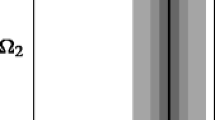Conclusion
I have discussed a concept of random distribution of properties in classes and defined a concept of random conjunction of properties; I have also discussed measures of various kinds of randomness. In concluding, I shall only mention some further problems which await treatment. Both the concept of random conjunction and the measures of randomness rest upon the notion of probability, which was not explicitly dealt with in this paper. Since, however, assumptions of randomness are frequently brought forward as justifications for working with probabilities, the relationship of randomness and probability should be examined in detail. Another task is to show which concepts of randomness are relevant in the sciences. It seems that the concept of random distribution of properties in classes, though interesting in itself and of relevance to statistics, has no use in theories of the empirical sciences. However, the assumption of randomness in the sense of stochastic independence, very often combined with the notion of randomness in the sense of equiprobability, or maximum primitive randomness, undoubtedly plays a role in various fields of science. I do not know of any case where the measures of randomness are directly employed; the idea of stochastic dependence and that of probabilities other than equiprobabilities are, of course, widley used. Finally, some of the assumptions of random conjunction of properties made in the sciences seem to be justifiable in terms of an actual independence of the properties. This raises the question as to whether, and to what extent, the notion of an actual independence is fundamental to concepts of randomness.
Similar content being viewed by others
Bibliography
Bohm, D. and Schützer, W., 1955, ‘The General Statistical Problem in Physics and the Theory of Probability’, Nuovo Cimento Suppl. 2, ser. 10, 2nd sem., 1004–47.
Bunge, M., 1956, ‘A Critique of the Frequentist Theory of Probability’, Congresso Internacional de Filosofia, São Paulo, Vol. 3, 787–92.
Cannavo, S., 1966, ‘Extensionality and Randomness in Probability Sequences’, Philosophy of Science 33, 134–46.
Cramér, H., 1946, Mathematical Methods of Statistics, Princeton University Press, Princeton.
Feller, W., 1957, An Introduction to Probability Theory and Its Applications, 1, John Wiley, New York, London.
Freudenthal, H., 1968, ‘Realistic Models in Probability’, In I.Lakatos (ed.), The Problem of Inductive Logic, North Holland, Amsterdam, pp. 1–14.
Kendall, M. G., 1941, ‘A Theory of Randomness’, Biometrika, 32, 1–15.
Keynes, J. M., 1921, A Treatise on Probability, MacMillan, London.
Kneale, W., 1949, Probability and Induction, Clarendon, Oxford.
Kolmogoroff, A. N., 1933, Grundbegriffe der Wahrscheinlichkeitsrechnung, Springer, Berlin.
Kolmogorov, A. N., 1963, ‘On Tables of Random Numbers’, Sankhya 25, 369–76.
Martin-Löf, P., 1969, ‘The Literature on von Mises Kollectivs Revisited’, Theoria 35, 12–37.
vonMisesR., 1957, Probability, Statistics and Truth, MacMillan, New York.
Pathria, R. K., 1962, ‘A Statistical Study of Randomness Among the First 10000 Digits of π’, Mathematics of Computation 16, 188–97.
Popper, K. R., 1968, The Logic of Scientific Discovery, Harper Torchbook, New York.
Rényi, A., 1966, Wahrscheinlichkeitsrechnung, Deutscher Verlag der Wissenschaften, Berlin.
Rescher, N., 1961, ‘The Concept of Randomness’, Theoria 27, 1–11.
Russell, B., 1948, Human Knowledge, Simon and Schuster, New York.
Spencer Brown, G., 1957, Probability and Scientific Inference, Longmans, London, New York, Toronto.
Stoneham, R. C., 1965, ‘A Study of 60000 Digits of the Transcendental‘e’’, American Mathematical Monthly 72, 483–500.
Venn, J., 1888, The Logic of Chance, Chelsea, New York.
vonWrightG. H., 1940, ‘On Probability’, Mind 49, 265–83.
vonWrightG. H., 1951, A Treatise on Induction and Probability, Routledge and Kegan Paul, London.
Author information
Authors and Affiliations
Additional information
Presently at Monteith College, Wayne State University, Detroit, U.S.A.
Rights and permissions
About this article
Cite this article
Kirschenmann, P. Concepts of randomness. J Philos Logic 1, 395–414 (1972). https://doi.org/10.1007/BF00255569
Issue Date:
DOI: https://doi.org/10.1007/BF00255569




